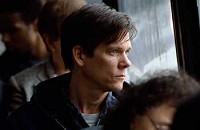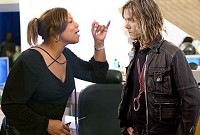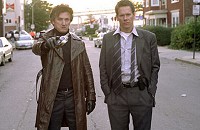 Speaking from the Dark Side
Speaking from the Dark Side
 The Woodsman might be, thematically, the darkest film you've done. Is it risky to play a character like this?
The Woodsman might be, thematically, the darkest film you've done. Is it risky to play a character like this?I don't know. Certainly people had turned it down and said "I can't do this". But I honestly don't think about my image, or my persona. I think you're either a personality or you're an actor, and an actor is willing to put on different hats, to play different sides of the human condition, and to show all aspects of life whether they be sad or dark or funny or rich or poor or old or young. I don't really think I have a specific image that I need to maintain - if I did it went out the window a long time ago. My issues with the movie were more: "Will I be able to pull it off? Will I do a good job with the part? Will the experience of watching the film be as powerful as my experience reading the script?" It was a first-time filmmaker, a young woman who'd only done one or two short films before. I was going to work for free, basically. It was going to need a lot of support down the line in terms of trying to get it publicised. It would be a big investment in terms of releasing it. Those were the things I was concerned about, not so much if it would be a black mark on career.
So what convinced you to put your faith in the director, Nicole Kassell?
It's curious. When you meet Nicky Kassell, it's like you're meeting a little girl. She's very quiet, young, small, and yet she's so strong in her beliefs and has worked so hard on this particular project, and has done so much research and is so clear with her convictions. The thing that impressed me the most about her, was that she was willing to say, "I don't know," and that is a quality that I certainly look for in a first-time director. It shows a kind of strength.
Can you turn off at the end of the day or is this character something that you had to carry with you?
You've got to take the shame that this character's feeling, and always have it there, kind of stuffed in your gut. Normally you will look at a scrip and break it down, and you say: "This is an easy day. I'm kissing the girl here, this is going to be good," or, "I've got my big crying scene that day, it's going to be bad." You break things down. With a movie like The Woodsman, every day's going to pretty much suck. There was a day for instance when I had no dialogue, and all I did all day was ride on the bus, so how bad could that be? But you have to still be riding on the bus with the kind of anguish that the character's feeling. That being said, I don't become the character, it's not like I wear my wardrobe home, I don't live by my character's name. I'm not all that precious about what I'm doing. There is definitely an effect that it has on you. It's not so much the effect of the end of the day, as it is knowing that you have to go back there the next day. That will affect the way you dream, your ability to sleep, your ability to eat, to make love, to laugh, knowing that you have to go back and do the thing the next day. It was very important to me during The Woodsman that I reconnected with my children every weekend, which was helpful because they really couldn't give a s**t. They need whatever they need and my work is just not that important in their lives, and that's a good thing because it makes you step out of yourself. Once I've finished with a movie, I can walk right away and I don't think about it again until later on when I do the press for it, which frankly, in terms of The Woodsman can be kind of unpleasant.
Do you think that independent cinema has a duty to examine controversial subjects?
I do. If it's not controversial then it should be interesting, risk-taking film styles. I think that the best thing that independent cinema can do is challenge the studios in terms of their content. I'm a supporter of the film industry and I like a good action picture or a good silly comedy just like the other guy does. I'm a film consumer; I go and I buy my tickets and I get the popcorn. I like to read in the paper that something has a huge weekend, because it has a nice trickle-down effect to the independent world. I like to go back and forth because I think that they can affect one another. I think that when you have a movie like Memento or Monster's Ball or Napoleon Dynamite or The Blair Witch Project, movies that are made in interesting, inexpensive, but unusual kind of ways, when you see them explode in that way, I can feel the studios take note of it, because I see the stuff trickle down. Memento makes some money and all of a sudden the scripts that are coming are not as linear as they were before. The studios are going, "Maybe we'll put the end in the beginning, that might work." It's kind of cool, that independent has a positive effect, instead of the same crap being turned out again and again and again. I do think it's a good place to do challenging films.
With Loverboy, you've now moved into directing — what kind of director are you?
On Mystic River, I was fascinated by how Clint Eastwood directs with very little fat. There's very little said. It's incredibly efficient. He has a crew that he's been working with again and again and again, which is very helpful. What happens is that in subtle ways it becomes this very, very well oiled machine, and people are just clicking and they know where we're going to be a step before. When I'd finished working with Clint, I really turned the heat up on this picture that I was directing, because I really wanted to take some of these techniques and this kind of ease and this calm and this church-like atmosphere that his set has, and I wanted to apply it to my own directing, and that lasted about two hours and I was screaming and pulling my hair out.
And what about the whole Six Degrees of Kevin Bacon phenomenon?
You know, when I first heard about it I thought this is a joke at my expense: can you believe that this a**hole can be connected to Marlon Brando or one of the greats? I guess I was having a low self-esteem day, and then I eventually met the guys that came up with the idea, and they really were fans. I kind of thought it would go away like pet rocks or something like that, but it seems to have had this kind of hang time. One of the things that I think is interesting about it, is that there is nothing concrete. There's nothing to make money on — unfortunately. It's just kind of a thought that's out there in the public consciousness, and I think that's kind of interesting. Let me tell you that I'm glad it's not Six Degrees of Kevin Spacey, because every time I would hear about it, I'd go, "Ah, him again." And if you take me out of it, the actual idea that we are connected by six degrees of separation, that we all climbed out of the same swamp, is kind of a beautiful one. If we thought about that a little bit more, we would live in a different world.
THANKS TO THE BFI, SUBSTANCE001 AND WENDY IDE, NOV.04


Light and dark: Bacon stars with Queen Latifah in Beauty Shop (above) and with Sean Penn in Mystic River (below)

KEVIN BACON FILMOGRAPHY...
Beauty Shop (2005)
Loverboy (2005)
Cavedweller (2004)






My Dog Skip (2000)
Stir of Echoes (1999)
Wild Things (1998)
Digging to China (1998)
Telling Lies in America (1997)
Picture Perfect (1997)
Sleepers (1996)
Balto (1995)
Apollo 13 (1995)
Murder in the First (1995)
The River Wild (1994)
The Air Up There (1994)
A Few Good Men (1992)
Pyrates (1991)
JFK (1991)
He Said, She Said (1991)
Queens Logic (1991)
Flatliners (1990)
Tremors (1990)
The Big Picture (1989)
Criminal Law (1988)
End of the Line (1988)
She's Having a Baby (1988)
Planes, Trains & Automobiles (1987)
White Water Summer (1987)
Quicksilver (1986)
Footloose (1984)
Enormous Changes at the Last Minute (1983)
Forty Deuce (1982)
Diner (1982)
Only When I Laugh (1981)
Hero at Large (1980)
Friday the 13th (1980)
Starting Over (1979)
Animal House (1978)
